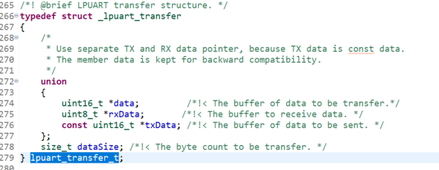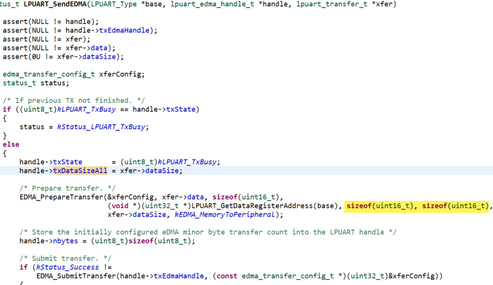- NXP Forums
- Product Forums
- General Purpose MicrocontrollersGeneral Purpose Microcontrollers
- i.MX Forumsi.MX Forums
- QorIQ Processing PlatformsQorIQ Processing Platforms
- Identification and SecurityIdentification and Security
- Power ManagementPower Management
- MCX Microcontrollers
- S32G
- S32K
- S32V
- MPC5xxx
- Other NXP Products
- Wireless Connectivity
- S12 / MagniV Microcontrollers
- Powertrain and Electrification Analog Drivers
- Sensors
- Vybrid Processors
- Digital Signal Controllers
- 8-bit Microcontrollers
- ColdFire/68K Microcontrollers and Processors
- PowerQUICC Processors
- OSBDM and TBDML
-
- Solution Forums
- Software Forums
- MCUXpresso Software and ToolsMCUXpresso Software and Tools
- CodeWarriorCodeWarrior
- MQX Software SolutionsMQX Software Solutions
- Model-Based Design Toolbox (MBDT)Model-Based Design Toolbox (MBDT)
- FreeMASTER
- eIQ Machine Learning Software
- Embedded Software and Tools Clinic
- S32 SDK
- S32 Design Studio
- GUI Guider
- Zephyr Project
- Voice Technology
- Application Software Packs
- Secure Provisioning SDK (SPSDK)
- Processor Expert Software
-
- Topics
- Mobile Robotics - Drones and RoversMobile Robotics - Drones and Rovers
- NXP Training ContentNXP Training Content
- University ProgramsUniversity Programs
- Rapid IoT
- NXP Designs
- SafeAssure-Community
- OSS Security & Maintenance
- Using Our Community
-
- Cloud Lab Forums
-
- Home
- :
- i.MX フォーラム
- :
- i.MX RT
- :
- Re: mx rt 1020 send 9bit over DMA
mx rt 1020 send 9bit over DMA
- RSS フィードを購読する
- トピックを新着としてマーク
- トピックを既読としてマーク
- このトピックを現在のユーザーにフロートします
- ブックマーク
- 購読
- ミュート
- 印刷用ページ
- 新着としてマーク
- ブックマーク
- 購読
- ミュート
- RSS フィードを購読する
- ハイライト
- 印刷
- 不適切なコンテンツを報告
Hi
I am using an imx rt 1020 and try to send 9bit data over dma, but having trouble sending the 9th bit.
status_t LPUART_SendEDMA(LPUART_Type *base, lpuart_edma_handle_t *handle, lpuart_transfer_t *xfer)
the lpuart_transfer_t is defined as follows
typedef struct _lpuart_transfer
{
uint8_t *data; /*!< The buffer of data to be transfer.*/
size_t dataSize; /*!< The byte count to be transfer. */
} lpuart_transfer_t;
I tried to split uint16_t bytes in two bytes and sent that over, but it doesn't work.
uint32_t txIndex = 0;
for (uint32_t i = 0; i < length; i++)
{
// T == uint16_t
T d = data[i];
if (sizeof(T) == 2)
{
_txBuffer[txIndex++] = d & 0xFF ;
_txBuffer[txIndex++] = (d & 0x100) >> 8 ;
}
else
{
_txBuffer[txIndex++] = d;
}
}
_sendXfer.data = _txBuffer;
_sendXfer.dataSize = length;
LPUART_SendEDMA(_instance, &_uartDmaHandle, &_sendXfer);
this sends
but is should send one "9bit byte" 0x108.
I am obviously doing this wrong, how can I send 9bits over DMA?
解決済! 解決策の投稿を見る。
- 新着としてマーク
- ブックマーク
- 購読
- ミュート
- RSS フィードを購読する
- ハイライト
- 印刷
- 不適切なコンテンツを報告
Hello
Hope you are well and I apologize for my delayed reply.
Commonly the 9bit is used to send the parity bit and have 8 bits of data, this can be done in the example without the need of setting anything extra besides the 9th bit and parity enable.
I did some modifications to the example so it supports the 9bith data without parity:
1. Modified the data types from structure "lpuart_transfer_t" so the uint´s are of 16bits.
2. In LPUART_SendEDMA() modified the parameters from EDMA_PrepareTransfer() function, the parameters I modified are bytesEachRequest and transferBytes:
Here are my results:
Notes: xfer.dataSize needs to be in multiples of 2. If you write 4 to that variable then 2 9bit LPUART frames are sent.
Let me know if this is helpful, if you have more questions do not hesitate to ask me.
Best regards,
Omar
- 新着としてマーク
- ブックマーク
- 購読
- ミュート
- RSS フィードを購読する
- ハイライト
- 印刷
- 不適切なコンテンツを報告
Hello,
I am also addressing the 9-bit mode of LPUART via eDMA. I modified the code as Omar_Anguiano wrote. I am unable to send more than one 9-bit byte. Each byte sent has 1 at the beginning e.g. if I send 0x48 it sends 0x148, if I send 0x02 it sends 0x102.
#include "pin_mux.h"
#include "clock_config.h"
#include "board.h"
#include "fsl_lpuart_edma.h"
#include "fsl_dmamux.h"
/*******************************************************************************
* Definitions
******************************************************************************/
#define DEMO_LPUART LPUART3
#define DEMO_LPUART_CLK_FREQ BOARD_DebugConsoleSrcFreq()
#define LPUART_TX_DMA_CHANNEL 0U
#define LPUART_RX_DMA_CHANNEL 1U
#define LPUART_TX_DMA_REQUEST kDmaRequestMuxLPUART3Tx
#define LPUART_RX_DMA_REQUEST kDmaRequestMuxLPUART3Rx
#define EXAMPLE_LPUART_DMAMUX_BASEADDR DMAMUX
#define EXAMPLE_LPUART_DMA_BASEADDR DMA0
#define ECHO_BUFFER_LENGTH 8
/*******************************************************************************
* Prototypes
******************************************************************************/
/* LPUART user callback */
void LPUART_UserCallback(LPUART_Type *base, lpuart_edma_handle_t *handle, status_t status, void *userData);
/*******************************************************************************
* Variables
******************************************************************************/
lpuart_edma_handle_t g_lpuartEdmaHandle;
edma_handle_t g_lpuartTxEdmaHandle;
edma_handle_t g_lpuartRxEdmaHandle;
AT_NONCACHEABLE_SECTION_INIT(uint8_t g_tipString[]) =
"LPUART EDMA example\r\nSend back received data\r\nEcho every 8 characters\r\n";
AT_NONCACHEABLE_SECTION_INIT(uint8_t g_txBuffer[ECHO_BUFFER_LENGTH]) = {0};
AT_NONCACHEABLE_SECTION_INIT(uint8_t g_rxBuffer[ECHO_BUFFER_LENGTH]) = {0};
AT_NONCACHEABLE_SECTION_INIT(uint16_t test[ECHO_BUFFER_LENGTH]) = {0};
volatile bool rxBufferEmpty = true;
volatile bool txBufferFull = false;
volatile bool txOnGoing = false;
volatile bool rxOnGoing = false;
edma_config_t config;
/*******************************************************************************
* Code
******************************************************************************/
/* LPUART user callback */
void LPUART_UserCallback(LPUART_Type *base, lpuart_edma_handle_t *handle, status_t status, void *userData)
{
userData = userData;
if (kStatus_LPUART_TxIdle == status)
{
txBufferFull = false;
txOnGoing = false;
}
if (kStatus_LPUART_RxIdle == status)
{
rxBufferEmpty = false;
rxOnGoing = false;
}
}
/*!
* @brief Main function
*/
int main(void)
{
lpuart_config_t lpuartConfig;
lpuart_transfer_t xfer;
lpuart_transfer_t sendXfer;
lpuart_transfer_t receiveXfer;
BOARD_ConfigMPU();
BOARD_InitBootPins();
BOARD_InitBootClocks();
/* Initialize the LPUART. */
/*
* lpuartConfig.baudRate_Bps = 115200U;
* lpuartConfig.parityMode = kLPUART_ParityDisabled;
* lpuartConfig.stopBitCount = kLPUART_OneStopBit;
* lpuartConfig.txFifoWatermark = 0;
* lpuartConfig.rxFifoWatermark = 0;
* lpuartConfig.enableTx = false;
* lpuartConfig.enableRx = false;
*/
LPUART_GetDefaultConfig(&lpuartConfig);
lpuartConfig.baudRate_Bps = BOARD_DEBUG_UART_BAUDRATE;
lpuartConfig.enableTx = true;
lpuartConfig.enableRx = true;
LPUART_Init(DEMO_LPUART, &lpuartConfig, DEMO_LPUART_CLK_FREQ);
/* Init DMAMUX */
DMAMUX_Init(EXAMPLE_LPUART_DMAMUX_BASEADDR);
/* Set channel for LPUART */
DMAMUX_SetSource(EXAMPLE_LPUART_DMAMUX_BASEADDR, LPUART_TX_DMA_CHANNEL, LPUART_TX_DMA_REQUEST);
DMAMUX_SetSource(EXAMPLE_LPUART_DMAMUX_BASEADDR, LPUART_RX_DMA_CHANNEL, LPUART_RX_DMA_REQUEST);
DMAMUX_EnableChannel(EXAMPLE_LPUART_DMAMUX_BASEADDR, LPUART_TX_DMA_CHANNEL);
DMAMUX_EnableChannel(EXAMPLE_LPUART_DMAMUX_BASEADDR, LPUART_RX_DMA_CHANNEL);
/* Init the EDMA module */
EDMA_GetDefaultConfig(&config);
EDMA_Init(EXAMPLE_LPUART_DMA_BASEADDR, &config);
EDMA_CreateHandle(&g_lpuartTxEdmaHandle, EXAMPLE_LPUART_DMA_BASEADDR, LPUART_TX_DMA_CHANNEL);
EDMA_CreateHandle(&g_lpuartRxEdmaHandle, EXAMPLE_LPUART_DMA_BASEADDR, LPUART_RX_DMA_CHANNEL);
/* Create LPUART DMA handle. */
LPUART_TransferCreateHandleEDMA(DEMO_LPUART, &g_lpuartEdmaHandle, LPUART_UserCallback, NULL, &g_lpuartTxEdmaHandle, &g_lpuartRxEdmaHandle);
/* Send out. */
test[0] = 0x48;
xfer.data = test;
xfer.dataSize = 2;
txOnGoing = true;
LPUART_SendEDMA(DEMO_LPUART, &g_lpuartEdmaHandle, &xfer);
/* Wait send finished */
while (txOnGoing)
{
}
test[0] = 0x02;
xfer.data = test;
xfer.dataSize = 2;
txOnGoing = true;
LPUART_SendEDMA(DEMO_LPUART, &g_lpuartEdmaHandle, &xfer);
while (1);
}
This is the result:
I need the first byte to be 0x148 and the second only 0x02. There is also the problem of having to send each byte separately.
If I edit the code to send the data:
/* Send out. */
test[0] = 0x48;
test[1] = 0x02;
xfer.data = test;
xfer.dataSize = 4;
txOnGoing = true;
LPUART_SendEDMA(DEMO_LPUART, &g_lpuartEdmaHandle, &xfer);
/* Wait send finished */
while (txOnGoing)
{
}This is the result:
What could be the problem?
Besides, this is only half of what I'm dealing with. The other is receiving data in 9-bit mode. Again, the first byte must have a flag of 1 and the other flags for the data are 0.
- 新着としてマーク
- ブックマーク
- 購読
- ミュート
- RSS フィードを購読する
- ハイライト
- 印刷
- 不適切なコンテンツを報告
Hi @masterboy ,
Just had a real quick look at your code which looks fine at a first glance. One thing that you seem to miss is to configure the uart as 9bit
```
LPUART_Enable9bitMode
```
Does that fix anything? If not, I'll have another look
- 新着としてマーク
- ブックマーク
- 購読
- ミュート
- RSS フィードを購読する
- ハイライト
- 印刷
- 不適切なコンテンツを報告
Hello
Hope you are well and I apologize for my delayed reply.
Commonly the 9bit is used to send the parity bit and have 8 bits of data, this can be done in the example without the need of setting anything extra besides the 9th bit and parity enable.
I did some modifications to the example so it supports the 9bith data without parity:
1. Modified the data types from structure "lpuart_transfer_t" so the uint´s are of 16bits.
2. In LPUART_SendEDMA() modified the parameters from EDMA_PrepareTransfer() function, the parameters I modified are bytesEachRequest and transferBytes:
Here are my results:
Notes: xfer.dataSize needs to be in multiples of 2. If you write 4 to that variable then 2 9bit LPUART frames are sent.
Let me know if this is helpful, if you have more questions do not hesitate to ask me.
Best regards,
Omar
- 新着としてマーク
- ブックマーク
- 購読
- ミュート
- RSS フィードを購読する
- ハイライト
- 印刷
- 不適切なコンテンツを報告
@Omar_Anguiano Thank you very much! Took me a while before I could dip into this, but finally got this to work!
- 新着としてマーク
- ブックマーク
- 購読
- ミュート
- RSS フィードを購読する
- ハイライト
- 印刷
- 不適切なコンテンツを報告
Dear nxp
Would anybody care to give some guidance? How do i send 9bit over lpuart using dma?
- 新着としてマーク
- ブックマーク
- 購読
- ミュート
- RSS フィードを購読する
- ハイライト
- 印刷
- 不適切なコンテンツを報告
Dear NXP
if there is any better way, please let me know. For now just went for a hacky blocking write
virtual void Write(T *data, uint32_t length)
{
projectAssert(sizeof(_txBuffer) > length, ErrorCodeUartTxMessageTooLarge);
if (sizeof(T) == 2)
{
// If T is uint16_t, write to uart blocking
// Waiting for answer how to send 9bit data over uart with DMA
// https://community.nxp.com/t5/i-MX-RT/mx-rt-1020-send-9bit-over-DMA/td-p/1360134
for (uint32_t i=0; i<length; i++)
{
while (!(_instance->STAT & LPUART_STAT_TDRE_MASK))
{
// Wait for transmit ready
}
uint32_t temp = _instance->DATA & 0xFFFFFC00UL;
temp |= (uint32_t)data[i];
_instance->DATA = temp;
}
}
else if (sizeof(T) == 1)
{
// Else... regular send data over DMA
xSemaphoreTake(_txSemaphore, portMAX_DELAY);
for (uint32_t i = 0; i < length; i++)
{
_txBuffer[i] = data[i];
}
_sendXfer.data = _txBuffer;
_sendXfer.dataSize = length;
LPUART_SendEDMA(_instance, &_uartDmaHandle, &_sendXfer);
}
else
{
// For now we only support 8 bit and 16 bit data types
projectAssert(0, ErrorCodeUartUnsupportedType);
}
}




